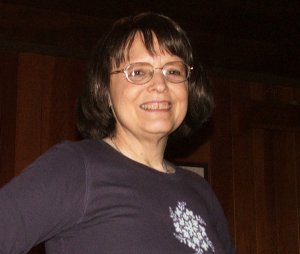EUGENE, Ore. — (Feb. 27, 2013) — "Betrayal violates us," write University of Oregon psychologists Jennifer Freyd and Pamela Birrell in the preface of a new book that tackles the devastating act and probes the deep underpinnings of why people cover it up.
 "Blind to Betrayal" (John Wiley & Sons, 224 pages) hits the bookstands March 11. Freyd, an expert on betrayal and child abuse, and Birrell, a licensed clinical psychologist and senior instructor in the UO Department of Psychology, present case studies of unfaithful spouses, abuse by powerful authority figures and corrupt institutions. More importantly, they address coming to grips with betrayal and how doing so helps victims move on.
"Blind to Betrayal" (John Wiley & Sons, 224 pages) hits the bookstands March 11. Freyd, an expert on betrayal and child abuse, and Birrell, a licensed clinical psychologist and senior instructor in the UO Department of Psychology, present case studies of unfaithful spouses, abuse by powerful authority figures and corrupt institutions. More importantly, they address coming to grips with betrayal and how doing so helps victims move on.
In recent years, the world's media have been filled with stories of betrayal, including sexual abuse of young boys by priests and by an assistant football coach at one of the nation's most-respected college football programs. Freyd often is among psychologists asked by the media to try to help people understand the underlying complexities.
"Everyone is touched by betrayal," said Freyd, currently the editor of the Journal of Trauma & Dissociation, in an interview. "Betrayal can happen in close personal relationships and in larger social contexts, such as the workplace. If we reflect on our own lives, we realize we have all experienced betrayal. What is the impact of betrayal? And why should we deal with it? Do we turn a blind eye or do we confront it?"
 In the book's opening chapter, Freyd and Birrell present the case history of a married woman who was betrayed by her unfaithful husband. As the chapter closes, the reader is told: "On discovery of betrayal, a key response is to reorganize one's perceptions of what has happened — to rewrite history. Betrayal therefore has a fundamental impact on one's perceptions of reality."
In the book's opening chapter, Freyd and Birrell present the case history of a married woman who was betrayed by her unfaithful husband. As the chapter closes, the reader is told: "On discovery of betrayal, a key response is to reorganize one's perceptions of what has happened — to rewrite history. Betrayal therefore has a fundamental impact on one's perceptions of reality."
A paragraph later, the authors address the issue head on: "And yet, although betrayal is so common and insidious, very little has been written about it in the psychological literature. Psychology as a discipline may suffer from betrayal blindness. Part of the problem stems from a tendency in clinical psychology and psychiatry to focus on individuals and individual symptoms. As a result, the relations between people — betrayal and its blindness — are not seen."
 For many people, Freyd said, the first betrayals often are experienced in early childhood where there is little option to confront the full reality. "In fact," she said, "it usually is safer for children to be blind to betrayal when it comes from the hands of a caregiver or someone the child trusts. In that situation, seeing the betrayal would likely only make matters worse — because a natural response to seeing betrayal is to confront it in some way. If a child confronts a betraying caregiver his or her situation is likely to become worse, even threatening survival."
For many people, Freyd said, the first betrayals often are experienced in early childhood where there is little option to confront the full reality. "In fact," she said, "it usually is safer for children to be blind to betrayal when it comes from the hands of a caregiver or someone the child trusts. In that situation, seeing the betrayal would likely only make matters worse — because a natural response to seeing betrayal is to confront it in some way. If a child confronts a betraying caregiver his or her situation is likely to become worse, even threatening survival."
Blindness to betrayal is a survival response, she said, but there is a high price for not seeing the betrayal for what it is. "It keeps us from being fully strong, alive or healthy," she said. "It makes us vulnerable to more betrayal makes it difficult to have truly intimate relationships."
Blind to Betrayal tackles the why behind the blindness, details its toxicity and extensively explores the healing power of coming to grips with betrayals that occur. The book has garnered praise from early reviewers.
About the University of Oregon
The University of Oregon is among the 108 institutions chosen from 4,633 U.S. universities for top-tier designation of "Very High Research Activity" in the 2010 Carnegie Classification of Institutions of Higher Education. The UO also is one of two Pacific Northwest members of the Association of American Universities.
Media Contact: Jim Barlow, director of science and research communications, 541-346-3481, jebarlow@uoregon.edu
Sources: Jennifer Freyd, professor of psychology, 541-346-4929, jjf@uoregon.edu, and Pamela Birrell, senior instructor of psychology, 541-346-4932, pbirrell@uoregon.edu
Follow UO Science on Facebook: http://www.facebook.com/UniversityOfOregonScience
Note: The University of Oregon is equipped with an on-campus television studio with satellite uplink capacity, and a radio studio with an ISDN phone line for broadcast-quality radio interviews. Call the Media Contact above to begin the process.